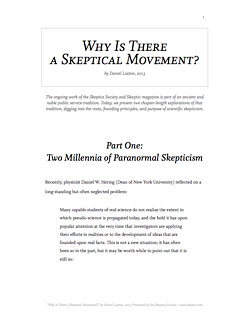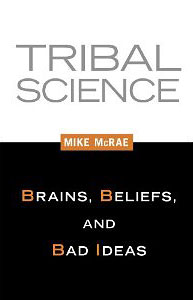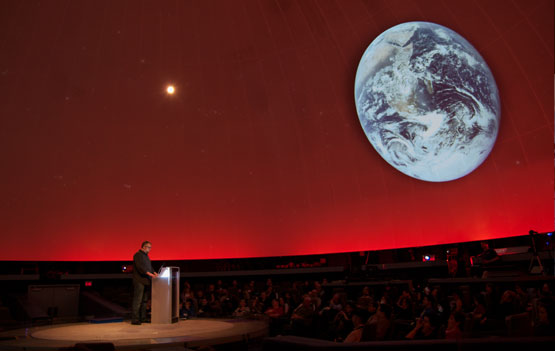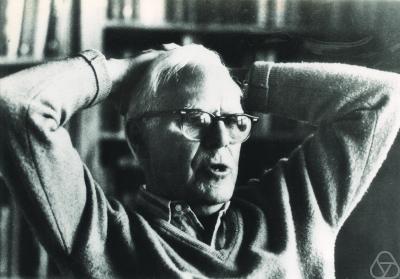by
Daniel Loxton, Feb 11 2014
 For much of the past year I hoped to find the time to read and review UK science teacher Alom Shaha’s The Young Atheist’s Handbook, which had great buzz among softer atheist voices. Finally I found a moment last year to dig into the book. And loved it. It’s a brisk, wonderful read—and every bit as moving, and as laudably pluralistic, as its reputation suggested. It was an experience I really enjoyed. I wanted to tell people about it.
For much of the past year I hoped to find the time to read and review UK science teacher Alom Shaha’s The Young Atheist’s Handbook, which had great buzz among softer atheist voices. Finally I found a moment last year to dig into the book. And loved it. It’s a brisk, wonderful read—and every bit as moving, and as laudably pluralistic, as its reputation suggested. It was an experience I really enjoyed. I wanted to tell people about it.
The question was, where?
As many readers know, I am an atheist in my personal life. At the same time, in my professional life I am an advocate for old school “scientific” skepticism (PDF). I regularly argue that the distinct and valuable tradition of scientific skepticism should be clearly distinguished from other parallel rationalist movements, and from the religious and political beliefs of individual skeptics—including my own. Skepticism is not an atheists only club. Continue reading…
comments (6)
by
Daniel Loxton, Jan 06 2014
Our colleagues over at the Science-Based Medicine blog, including Skepticblog’s Steve Novella, have announced the creation of a new advocacy and educational organization, the Society for Science-Based Medicine.
The attempt to confront medical pseudoscience, examine paranormal and supernatural healing claims, and expose outright medical quackery is one of the deepest and oldest of the pillars of scientific skepticism. From homeopathy to psychic surgery, such claims will always remain priorities for skepticism, and for skeptical organizations such as the one I represent, the Skeptics Society. Indeed, I write on medical claims myself, such as in this article or this for our own free eSkeptic newsletter.
But focus is a powerful thing. Just as I frequently advocate disentangling the unique mandate of scientific skepticism from atheism and other parallel rationalist movements, so too is there a clear value in having dedicated, full-time science-based advocacy organizations that discuss medicine and only medicine. The topic is certainly large enough (large enough, indeed, for hundreds of organizations worldwide) complex enough, and sufficiently pressing in ethical urgency to deserve dedicated watchdog efforts. Continue reading…
comments (4)
by
Daniel Loxton, Jan 05 2014
Happy New Year, folks! I’m settling back into work having celebrated an epic holiday season with my family, and feeling a bit like I’m going to explode. The music is on loud in here. I’m rested and happy, looking back over a fascinating year—and looking forward to the bright horizons of the year ahead.
Do you feel it? That soaring quality in the air, that sense that this is a year we accomplish beautiful, useful things? That this is a year when we will make the world a little bit better? Continue reading…
Comments Off
by
Daniel Loxton, May 13 2013
Today I thought I might share another excerpt from my two-chapter “Why Is There a Skeptical Movement?”(PDF)—the section that comes immediately before the “‘Testable Claims’ is Not a ‘Religious Exemption’” excerpt I posted last week. (My apologies for any confusion in presenting these out of their original order.) Both excerpts are taken from the second chapter of “Why Is There a Skeptical Movement?” I encourage anyone interested in the topic of scientific skepticism—enthusiasts and critics alike—to consider the larger piece in its entirety if at all possible. (It’s free.) Part One delves into the long, useful, and (I think) noble tradition of scientific skepticism, tracing its development alongside the scientific mainstream in the twentieth and nineteenth centuries and beyond—all the way back to classical antiquity. This excerpt today assumes you’re familiar with the fact that serious attempts to study, investigate, and understand paranormal claims (and to rein in or expose paranormal fraud) go back a very, very long way. Today we’ll consider the context of the most important “recent” milestone on that long road: the founding in the 1970s of formal groups dedicated specifically to the pursuit of scientific skepticism as an organized public service project. (See Part One of “Why Is There a Skeptical Movement?” for further details regarding this and earlier examples of skeptical organizing.)
Continue reading…
comments (4)
by
Daniel Loxton, May 05 2013

Token Skeptic podcast host Kylie Sturgess.
I was pleased recently to speak with Kylie Sturgess for her Token Skeptic podcast (audio available here) about my research into the history of skepticism—in particular, my recent two-chapter piece “Why Is There a Skeptical Movement?” (PDF) and Junior Skeptic issues 45 and 46.
I found it a very useful conversation about the many skeptics who have lived, worked, and left the stage before us; their legacy; and the foundational principles of the movement they inspired. For that reason, I’m delighted that Sturgess has now provided a transcript, posted at her Patheos blog Token Skeptic. Here’s an excerpt:
Continue reading…
comments (2)
by
Daniel Loxton, Feb 07 2013

DOWNLOAD Why Is There a Skeptical Movement? (PDF)
Following on the themes of my previous post (riffing on Steve Novella’s recent debunking of some of the oldest clichés about scientific skepticism) I’m pleased to announce that the Skeptics Society released my latest project yesterday in our eSkeptic newsletter:
For over twenty years, the Skeptics Society and Skeptic magazine have labored at the forefront of the skeptical movement—constantly experimenting, often pushing the boundaries, but always circling back to the heart of the skeptical tradition. …
This week, we’re pleased to present Daniel Loxton’s challenging and provocative new project, “Why Is There a Skeptical Movement?” (PDF). Almost two years in the writing, these two meticulously-researched chapter-length explorations dig deeply into the roots, founding principles, and purpose of scientific skepticism.
It’s a whopper (almost 24,000 words, counting the endnotes) and a labor of love. I hope you enjoy it!
DOWNLOAD “Why Is There a Skeptical Movement?” PDF
Comments Off
by
Daniel Loxton, Feb 21 2012
 I’ve been enjoying an “Uncorrected Advance Reading Copy” of the upcoming U.S. edition of Mike McRae’s Tribal Science from Prometheus Books, which has once again put me in mind of something I think about often: the considerable bogusness of the conceit of “skeptics” versus “believers.” There is a social subculture that can be called “skepticism” and there is a niche of scholarly activity by the same name, but it’s a mistake to suppose that skeptics and believers are very different sorts of people. The true landscape of skepticism and belief is so complex that I can’t resist summing it up with this wonderful T-shirt slogan from Ben Goldacre: “I think you’ll find it’s a bit more complicated than that.” Bulldozing the complexity of human striving for understanding into tribal “skeptic” and “believer ” piles distorts reality, and makes it harder to do the already difficult work of solving mysteries and promoting science literacy.
I’ve been enjoying an “Uncorrected Advance Reading Copy” of the upcoming U.S. edition of Mike McRae’s Tribal Science from Prometheus Books, which has once again put me in mind of something I think about often: the considerable bogusness of the conceit of “skeptics” versus “believers.” There is a social subculture that can be called “skepticism” and there is a niche of scholarly activity by the same name, but it’s a mistake to suppose that skeptics and believers are very different sorts of people. The true landscape of skepticism and belief is so complex that I can’t resist summing it up with this wonderful T-shirt slogan from Ben Goldacre: “I think you’ll find it’s a bit more complicated than that.” Bulldozing the complexity of human striving for understanding into tribal “skeptic” and “believer ” piles distorts reality, and makes it harder to do the already difficult work of solving mysteries and promoting science literacy.
The truth is that self-identified skeptics are not so terribly good at critical or scientific thinking. There’s little shame in that; nobody is all that good at those things. Nor, on the other hand, are paranormal “believers” all that terribly bad. Regardless of our intellectual commitments, regardless of our investments in this or that ideology or belief, humans everywhere are pretty damn smart—and also pretty dumb.
Continue reading…
comments (34)
by
Daniel Loxton, Apr 12 2011

Daniel Loxton Keynote Address at LogiCON 2011. Photo by Mark Iocchelli
Last weekend I was honored to deliver the keynote address at LogiCON, a skeptical event held at Edmonton’s Telus World of Science. It’s an amazing facility, and it was an inspiring event.
LogiCON
Organized by the Greater Edmonton Skeptics Society, LogiCON 2011 was a curated sequel to (and departure from) a successful 2010 event built on the open SkeptiCamp model.
Billed as “Critical Thinking for Everyone,” LogiCON was explicitly conceived and promoted as a science outreach event rather than as a rally for self-identified skeptics. Though it incidentally did bring together Edmonton’s skeptical community, it was designed first and foremost to introduce the public to science-based approaches to evidence in general — and to many paranormal claims in particular. Continue reading…
comments (13)
by
Daniel Loxton, Sep 19 2010

[Continued from Part I]
Speaking personally, I must say it's a joy to watch the growth of the skeptical subculture, humming with its proliferation of cons and pub nights and vibrant online portals. And yet, much of that scene is related only indirectly to the cause I work to advance. At some risk of being misunderstood: it's not my goal to grow a social community, even though I am part of it.
My area of primary interest is more specific. As a (relatively junior) contributor to the specialized field of skepticism, I care most about active efforts to investigate fringe science topics, share the findings, and promote science literacy as widely as possible. After decades of work, this research and educational outreach effort eventually became the seed for a thriving subculture, but it is not synonymous with that subculture.
This is a distinction that could save a lot of flame wars:
Continue reading…
comments (26)
by
Daniel Loxton, May 25 2010

Martin Gardner portrait by Konrad Jacobs. Courtesy Oberwolfach Photo Collection
By now you will most likely have heard the sad news of the death of Martin Gardner — the father of modern skepticism — at age 95. He was, as his friend James Randi wrote, “a very bright spot in my firmament.”
Many people feel the same way, and for good reason. Gardner’s impact cannot be overstated. It is fair to argue that Martin Gardner created the modern skeptical literature from whole cloth. His 1952 book In the Name of Science (retitled Fads & Fallacies in the Name of Science for the second and subsequent editions; hereafter referred to as Fads & Fallacies) set the standard that later led to the creation of CSICOP — and to all that has followed since. Through his books and his “Notes of a Fringe-Watcher” column in the Skeptical Inquirer, Martin Gardner was a meticulous skeptical scholar for six decades. (Amazingly, his most recent Skeptical Inquirer articles appeared earlier this year.) Continue reading…
comments (20)
 For much of the past year I hoped to find the time to read and review UK science teacher Alom Shaha’s The Young Atheist’s Handbook, which had great buzz among softer atheist voices. Finally I found a moment last year to dig into the book. And loved it. It’s a brisk, wonderful read—and every bit as moving, and as laudably pluralistic, as its reputation suggested. It was an experience I really enjoyed. I wanted to tell people about it.
For much of the past year I hoped to find the time to read and review UK science teacher Alom Shaha’s The Young Atheist’s Handbook, which had great buzz among softer atheist voices. Finally I found a moment last year to dig into the book. And loved it. It’s a brisk, wonderful read—and every bit as moving, and as laudably pluralistic, as its reputation suggested. It was an experience I really enjoyed. I wanted to tell people about it.


 I’ve been enjoying an “Uncorrected Advance Reading Copy” of the
I’ve been enjoying an “Uncorrected Advance Reading Copy” of the 
